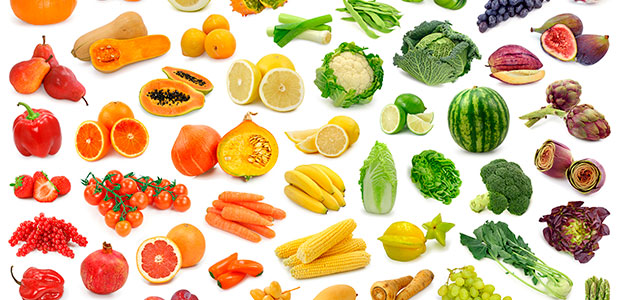Advertisement
Colourful Carotenes
Red, yellow, purple, green - nature's palette protects against disease

Carotenes are a highly coloured (red to yellow) group of fat-soluble plant pigments. A great deal of scientific investigation has shown that dietary intake of carotenes offers protection against developing certain cancers and other diseases.
Carotenes are what makes spinach green and oranges orange. All organisms that rely on the sun for energy contain carotene molecules.
The antioxidant effects of these pigments play a crucial role in protecting the organism against damage during the process of photosynthesis, when sunlight is converted into chemical energy.
In humans, carotenes play two primary roles: some are converted into vitamin A, and all exert antioxidant activity. Six hundred carotenes have been identified, and about thirty to fifty of them are believed to have vitamin A activity.
Vitamin A plays a number of important roles in our bodies, such as in growth and development and immune activation. Carotenes that the body is able to convert to vitamin A are referred to as “provitamin A”carotenes. The best known of this group are beta-carotene and alpha-carotene. Some of the better-known carotenes have no provitamin-A activity, but possess considerably more potent antioxidant activity: these include lutein, lycopene, and zeaxanthin.
Research on human subjects has shown that individuals who regularly consume carotene-rich foods have a lower risk of developing cancers of the lung, skin, uterine, cervix, and gastrointestinal tract, as well as heart disease, macular degeneration, cataracts, and other health conditions linked to oxidative or free-radical damage.
Colour Code for Carotenes
Carotenes are found in all plant foods. In general, the greater the intensity of colour, the higher the level. In green leafy vegetables, beta-carotene is predominant. The orange- coloured fruits and vegetables – for example, carrots, apricots, mangoes, yams, and squash are excellent sources of beta-carotene.
Yellow vegetables have higher concentrations of yellow carotenes, hence a lowered provitamin-A activity, but the antioxidant benefits of the yellow carotenes like lutein and zeaxanthin are especially important in preventing damage to macula, the area of the retina responsible for central (fine) vision.
Red and purple vegetables and fruits such as tomatoes, red cabbage, berries, and plums, contain a large portion of non-vitamin A-active carotenes such as lycopene. Recently, Harvard researchers studied dietary questionnaires answered by over 47,000 participants and discovered that, of all of the different types of carotenes, only lycopene was clearly linked to protection against prostate cancer.
Legumes, grains, and seeds are also significant sources of carotenes. Carotenes are found in various animal foods, too, such as salmon and other fish, egg yolks, shellfish, milk, and poultry.
In supplement form, good sources of mixed carotenes include palm-oil carotene products, algal products, carrot oil, and the various “green drinks,” such as dehydrated barley greens or wheat grass.
For proven protection against disease, include carotenes in your diet or in supplements.
A guide to carotenes
| Carotene | Vitamin A activity (%) | Food sources |
| Beta-carotene | 100 | Green plants, carrots, sweet potatoes, squash, spinach, apricots, green peppers |
| Alpha-carotene | 50-54 | Green plants, carrots, squash, corn, watermelons, green peppers, potatoes, apples, peaches |
| Gamma-carotene | 42-50 | Carrots, sweet potatoes, corn, tomatoes, watermelons, apricots |
| Beta-zeacarotene | 20-40 | Corn, tomatoes, yeast, cherries |
| Cryptoxanthin | 50-60 | Corn, green peppers, persimmons, papayas, lemons, oranges, prunes, apples, apricots, paprika, poultry |
| Lycopene | 0 | Tomatoes, carrots, green peppers, apricots, pink grapefruit |
| Zeaxanthin | 0 | Spinach, paprika, corn, fruits |
| Lutein | 0 | Green plants, corn, potatoes, spinach, carrots, tomatoes, fruits |
| Canthaxanthin | 0 | Mushrooms, trout, crustaceans |
| Crocetin | 0 | Saffron |
| Capasanthin | 0 | Red peppers, paprika |




